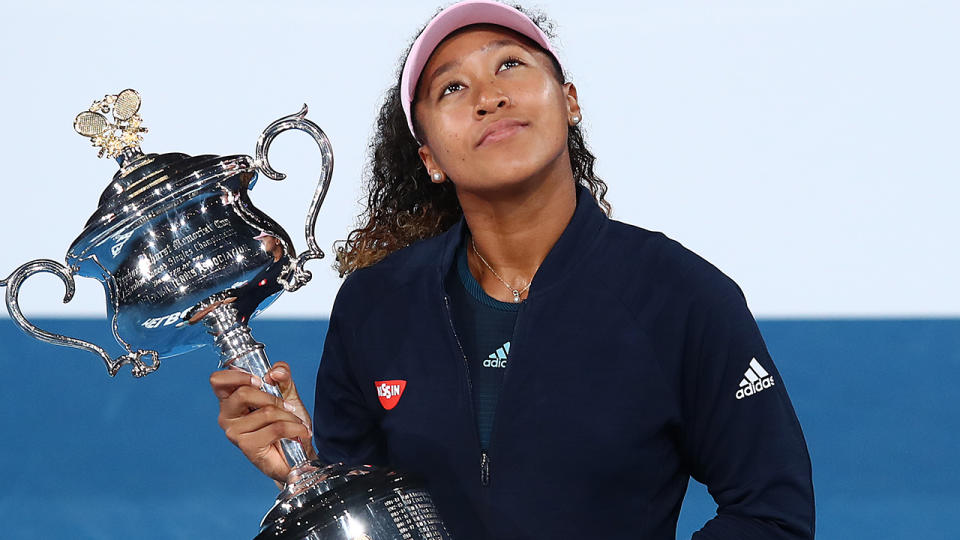'How Japanese is she?': Naomi Osaka at centre of new race debate
While the majority of Japan is celebrating Naomi Osaka’s Australian Open triumph, some have reservations.
Led by a congratulatory tweet from the prime minister, most of Japan revelled in Osaka’s dramatic win on Saturday night.
Osaka beat Petra Kvitova 7-6 (2), 5-7, 6-4 to claim a second-consecutive grand slam singles title, becoming the first Asian tennis player to reach No. 1 in the world rankings.
However Osaka’s ‘Japaneseness’ doesn’t seem to be sitting well with some.
On Wednesday, an opinion piece in the Japan Times asked ‘How Japanese is Naomi Osaka?’
Osaka was born in Japan – her mother is Japanese and her father is Haitian – and she moved to New York at age 3.

However she’s chosen to represent her homeland.
But Kuni Miyake, the author of the opinion piece, isn’t buying it.
“Japan’s mainstream media reported the breaking news referring to Naomi Osaka as the first Japanese female tennis player to win two consecutive grand slam titles and to be ranked World No. 1. Yes, she is. But not quite so, is she?” he wrote.
“How can multicultural Osaka represent Japan?
“It’s not because she had no other choice, but rather that her father wanted her to play for Japan for financial reasons.
“The Japan Tennis Association has reportedly offered more financial support than its U.S. counterpart. JTA seems to have made a critically important judgment.”

Not the first controversy
The article comes after Osaka was asked by a Japanese reporter to answer a question in Japanese on Sunday.
“Yesterday’s match, against Petra Kvitova, a left-handed player, must’ve been difficult to counter. Could you tell us, in Japanese, how difficult it was to deal with? Just one word about how you felt,” the reporter said.
Osaka replied: “I’m going to say it in English.”
Reporter asks Naomi Osaka to respond to her question using Japanese, she nonchalantly responds that she will in English. Japanese viewers are irritated at the media's obsession with trying to force Naomi into a Japanese identity for their own satisfaction… https://t.co/tB6ikwWWD6
— Mikaera Desu (ミカエラ) (@ciaela) January 27, 2019
She was also at the centre of a racism controversy earlier in the Australian Open when one of her main sponsors ‘whitewashed’ her in an advert.
Damn Shame…. A Japanese noodle company acknowledged “whitewashing” Naomi Osaka in online ads pic.twitter.com/mNjAhTreJ4
— TorqueBleuMedia (@TorqueBleu) January 24, 2019
Opinion still divided
Osaka’s grandfather, who lives in the remote fishing village of Nemuro on Japan’s northernmost island of Hokkaido, said Sunday he was relieved.
“My blood pressure is up,” 74-year-old Tetsuo Osaka said. “I’m really proud of how she won. She is so dear to me.”
Beyond dignitaries and relatives, average fans took pride in Osaka’s win.
“As a Japanese person, I’m very proud,” said 28-year Satoshi Mizutani, who works in finance.
“She showed a lot of character in coming back after dropping the second set.
“I think she is an inspiration to young people in Japan who can learn to do whatever they want if they work hard for it.”
However there were those who still held back.
A 60-year-old man reportedly told Al Jazeera he would “rather if a player who is completely Japanese wins a tournament”.
with agencies
